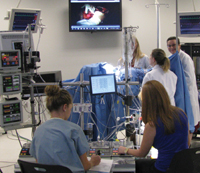|
|
|

|
Heart Lung Bypass
Perfusion simulations train students
in real-life scenarios
|
by Dawn Brazell
Public Relations
When he hears stifled laughter in the background, John Hollifield knows
trouble is coming.
 The College
of Health Professions (CHP) student has learned the sound probably is
coming from behind the control board, where Joseph J. Sistino, director
of the Division of Cardiovascular Perfusion, sits during simulations. The College
of Health Professions (CHP) student has learned the sound probably is
coming from behind the control board, where Joseph J. Sistino, director
of the Division of Cardiovascular Perfusion, sits during simulations.
Students
run
through
a perfusion simulation in the laboratory in the College of
Health Professions. http://www.musc.edu/pr/perfusion.mov
“When you’re in the simulation, you’re sweating,” he said of his
experiences in the college’s Cardiovascular Perfusion Simulation Lab.
“There’s going to be a power failure requiring a hand crank or an
oxygenator failure or air in the venous line.”
Sistino agreed. “We can make everything go really wrong from back here.”
That’s the point. The simulation lab, which opened in July 2009, lets
students learn how to handle a wide array of emergency conditions under
pressure so that it becomes second nature before they might face it in
real life. Hollifield said he has enjoyed it because they get more
experience in a shorter amount of time, and can practice the more
challenging skills they need to learn.
 Joseph J. Sistino
mans the control panel. Joseph J. Sistino
mans the control panel.
Sistino said it’s
been a great asset for the college.
“Students are not just better prepared, they’re more confident in
themselves. They become technically more proficient, and it also gives
them the confidence that when they get into a serious situation, they
are going to be able to handle it. An operating room is a very
stressful environment. It’s like an airplane that flies perfectly 99
percent of the time, but when something goes wrong, it can be very
serious.”
The goal is to do educational research on the simulator, such as having
students work in the middle of the night to measure the effects of
fatigue. They also plan to add more cameras to facilitate evaluations,
which will make it the best simulation lab in the nation, he said. They
spend as much time “debriefing” after sessions to evaluate themselves
as they do practicing in the lab.
Sistino said miscommunication contributes to 70 percent of adverse
events that happen in the operating room versus 40 percent caused
because of a mechanical problem. The simulation lab allows the students
to see how easily those miscommunications can happen and how to handle
that or a mechanical issue.
There are only 18 perfusion schools in the country, with MUSC being the
second college-based program to be started. MUSC is one of only three
perfusion schools in the nation to have such a simulator, and CHP just
hosted the 11th Annual Update on Perfusion Devices Workshop, the only
conference of its kind nationally.
The simulation lab is used during the conference to demonstrate
devices. This year’s conference was attended by 100 perfusionists, 27
students and 33 vendors. There were 18 formal presentations and
demonstrations.
“It’s a way to let professionals learn about new equipment and what the
future of the field is as far as new technology. The students attend,
and they get to meet perfusionists from all over the country. It’s a
good showcase for our students too because they make contacts all over
the country. It’s a win-win situation.”
Watch the video: http://www.musc.edu/pr/perfusion.mov
Friday, Nov. 12, 2010
|
|
|



 The College
of Health Professions (CHP) student has learned the sound probably is
coming from behind the control board, where Joseph J. Sistino, director
of the Division of Cardiovascular Perfusion, sits during simulations.
The College
of Health Professions (CHP) student has learned the sound probably is
coming from behind the control board, where Joseph J. Sistino, director
of the Division of Cardiovascular Perfusion, sits during simulations. 